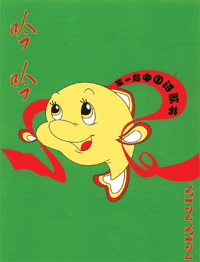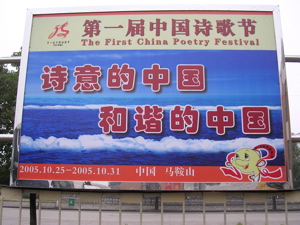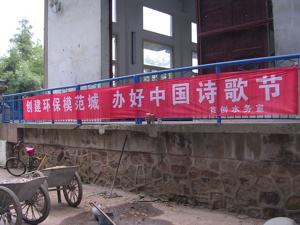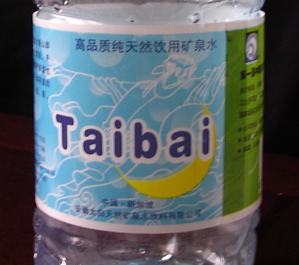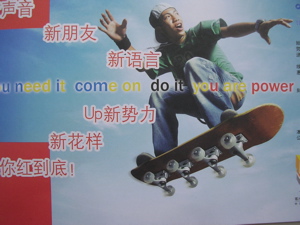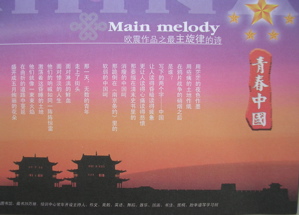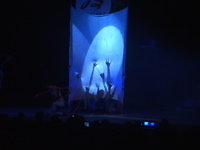By John A. Crespi
MCLC Resource Center Publication (Copyright November 2005)
It might come as a surprise that in a country so well known for its long poetic tradition, the First China Poetry Festival (Diyi jie Zhongguo shige jie) was only held this year. Indeed, the Internet Xinhua press release announcing the festival lamented this very fact, suggesting that since other countries around the world have such events, China ought to have one as well.
Such “me too” reasoning did not seem to bode well (nor did it ring particularly true given the frequency of poetry festivals all over China in recent years) as I prepared to head to the Yangtze River city of Ma’anshan in Anhui province, the site of an entire week of poetic festivities, including a scholarly conference to which I’d been invited. Due to some booking problems, I arrived at the conference quite late on the morning of October 27, barely in time to catch the tail end—in fact, just the last 20 minutes—of a session addressing the assigned topic “Chinese Poetry: The Unification of Nationality and Modernity.” For my seven minutes at the podium I read in Chinese a piece dutifully drafted several weeks before that tied ideas of local and global culture to practices of official and unofficial Chinese poetry and their respective forms of recitation. “Was there any middle ground between the two,” I asked by way of conclusion.
No sooner had I returned to my front row, “VIP” seat, than a fat brown mailing envelope with “American Friend” scribbled on its face thumped onto the table in front of me. A stout, middle-aged man in a dark blue suit and Hu Jintao hairdo stood nearby, smiling a bit sheepishly. It was not yet the moment to open up conversation (an American poet who had taken the same flight as I was reading his paper), so I took a polite look at the contents of the envelope. It was stuffed with newspaper clippings printed with long articles about the social import of a recent, award-winning “political-lyric long poem” “Questioning Heaven about Money” (Jinqian tian wen). From photos in the paper, I recognized the poet, Fan Ren, as the very same fellow looking on with interest as I leafed through the clippings. Before I was able to read the first two lines of his poem (“As I leaf lightly through the vast historical annals of money / A solemn, tragic wave surges through the ocean of my heart . . . “), more materials skidded into view: a blue paperback with a picture of the ultramodern Shanghai skyline across the bottom and the title Lyric Long Poem: Another Journey Begins printed in bright yellow across the top. Inserted between the pages of the book was a stapled stack of photocopied news and essay extracts, a PR packet of sorts, commenting on poetry recitations held in and around Shanghai to commemorate the 100th birthday of Deng Xiaoping. The author, another middle-aged fellow in another dark suit, was beaming at me, arms folded across his chest. On page seven of the packet two outsized, bold-face lines caught my eye: ” IT’S NOT JUST POLITICS, IT’S ALSO A WORK OF ART.”
I had come late, but now had truly arrived, at one of the year’s largest, most lavishly-funded official poetry events in China. As a conference participant, my own expenses were fully covered through the offices of the Museum of Modern Chinese Literature, but the main sponsors of the festival itself were the Ministry of Culture, the China Writers Association, and the Anhui Provincial Government. The scholarly meeting I had nearly missed was just one among many events planned for the week of October 25-31. From exhibitions of books, calligraphy, and ink stones to contests of poetry and folk song, and recitations by schoolchildren, actors, and poets, the humble city of Ma’anshan had been mobilized for cultural action.
Ma’anshan itself—as the festival’s PR materials along with practically every official speech made abundantly clear—has a longstanding link to China’s poetic tradition. It possesses built-in historical distinction as the former residence for a long listing of imperial-era poets. Xie Tiao, Meng Haoran, Su Shi, Jia Dao represent only the more famous of the over 600 poets who resided in or passed through this riverside town. The most famous of them all, Li Bai, spent his later years in Ma’anshan and (so the locals claim) lies buried nearby. Post-revolution Ma’anshan, on the other hand, has been better known as the site of the Ma’anshan Steel Company, whose flame-belching chimneys I could see at night from my hotel window. Today, however, Ma’anshan is one among dozens, if not hundreds, of mid-sized, semi-industrial Chinese cities seeking to invent an identity. Like its many urban counterparts all over China, Ma’anshan has over the past twenty years demolished its non-cost-effective but regionally distinct architecture, and replaced it with high-rise apartment buildings faced in white tile, office buildings with blue-tinted reflective windows, and row upon row of storefronts surmounted by garish billboards advertising cell phones, suits, shoes, and Sichuan-style fast-food. By now the city is more or less identical with fast-growing, rough-edged county towns in Liaoning, Henan, Yunnan, or even the Tibetan Autonomous Region. At the same rate local color has been destroyed, local industries in these second-tier urban centers have been competing with their counterpart cities to develop business connections domestically and abroad. And therein lies a problem: How, among the array of increasingly identical competitors, do these cities project a unique image in the supermarket of commercial investment? With the launching of the First China Poetry Festival, Ma’anshan seems to have discovered its niche. The result, as I discovered during my two-day stay, was a remarkable three-way intersection of poetry, commerce, and a single-party state.
Poetic Image Management
My own first encounter with the imaging of Ma’anshan came through the Internet, some weeks before the Festival. Wanting to learn something more about the event before actually going there, I ran a Google search. Beyond some scanty press releases, such as the one mentioned at the beginning of this report, precious little information came back—not even a schedule of events. Apparently this festival was an internal, neibu affair, less for public enjoyment than the pleasure of select invitees favored by the central and local governments. Or perhaps the organizers were afraid of being flooded by mobs of poetry lovers.
Or maybe the organizers themselves were only putting all the pieces together at the last minute. This last seemed most likely, as the festival logos—which Google did find—had only been finalized in mid-September. One was the chubby and approachable festival mascot (jixiangwu), Yin Yin, which I at first took to be some sort of cartoonish fish, but represents in fact a Yangtze river dolphin (fig. 1). Yin Yin’s name refers to the practice of traditional-style poetry chanting, an art for which Ma’anshan has hosted competitions over the past sixteen years. The other festival logo was a more serious, and sinuous, symbol: the character for “poetry” (shi) stylized to resemble a phoenix paired with a dragon (fig. 2). The former, yin creature looked left and back, at the past it would seem, while the latter, yang animal rose to the right to form the inevitable emblem of an upwardly mobile, future-oriented, rapidly modernizing China.
While pre-event publicity may have been lacking, I found upon arrival in Ma’anshan that the Festival organizers had festooned their city with promotional billboards, posters, placards, and banners. Some, like the vertical streamers hung on either side of the lampposts lining the city’s major avenues, were no different from those used for city festivals anywhere in the world. Others assumed a more Chinese form, like the innumerable tasseled lanterns touting the festival on one side, and a brand of local liquor on the other (fig 3).
The most prominent examples of local promotional aesthetics, however, were the slogans. In the wording of some, the reverberations of central state policy were clearly audible.
The phrase “Poetic China, Harmonious China” on this roadside billboard (fig. 4) is, of course, an adaptation of Hu Jintao’s call for Party members to “build a harmonious society.” But reading a little more deeply into the couplet, does the parallel structure of these paired phrases mean to suggest that a poetic China can create a harmonious China, and vice versa? Is there, then, a latent suggestion of cosmologic unity between the patternment of literature and the order of society at work here? The connections are, perhaps, not so mystical. Promoting poetry promotes Ma’anshan, and promoting Ma’anshan means bringing more business to this medium-sized metropolis. More business means more jobs, and not just for the local populace, but also for the massive surplus of transient laborers that big cities like Beijing and Shanghai can no longer absorb. More jobs for transient labor in cities like Ma’anshan, according to the calculus of the 11 th Five-year Plan, translates into social stability, and stability is the unstated but operative word in the more euphonious “harmony” (hexie). And there you have it: Poetry makes for a prosperous, harmonious, rising China. Returning to the poetry-as-phoenix/dragon logo, printed in the upper-left corner of the poster, one now understands how it merges either end of this chain of associations, literature and economics, into concise graphic form.
As for Yin Yin, though inspired by a warm rather than cold-blooded creature, for me at least his image possesses enough fish-like character to activate the homophonic connotations of “surplus” traditionally associated with the word yu (fish). Yin Yin’s place in the symbolic world of the festival thus complements the couplet on a companion poster: “Ocean of Poetry, Holiday of the People” (Shi de haiyang, renmin de jieri).
The Poetry Festival is a holiday of sorts, but like most modern holidays originates out of state decision-making, and in the context of recent Chinese government policies, an economically inspired “break” from labor akin to the state-initiated edicts establishing the two-day weekend and the weeks of leisure around National Day and Labor Day—all instituted to stimulate the burning off of surplus income. Read along such lines, this couplet welcomes the people to swim with Yin Yin by happily immersing themselves and their surplus income in the boundless ocean of consumer possibilities, an ocean again associated with Ma’anshan’s chosen token of urban identity, poetry.
Such happy logic is, of course, disturbed by the Yangtze river dolphin’s unfortunate distinction as quite possibly the first cetacean to be driven to extinction by human degradation of the natural environment. Seen this way, any correlations with “surplus” seem suspect, to say the least, and certainly make Yin Yin a troubled choice for a mascot, jixiang wu (literally, “auspicious creature”). But then again, as a Chinese poet pointed out to me, selecting an endangered animal to represent poetry in China today does seem bleakly appropriate. Offsetting all such concerns, however, was a less prominently displayed festival slogan. A long banner—strapped to the guardrail of a water transfer station on the banks of the Yangtze—took up the 11 th Five-Year Plan’s call for ecologically sustainable development by urging passersby to “Create an Environmental Model City, Make the China Poetry Festival a Success” (Chuangjian huanbao mofan cheng, banhao Zhongguo shige jie) (fig. 5).
Back downtown at the heart of the festivities, slogans met the eye almost everywhere: across storefronts, over intersections, and on entrances to public buildings and parks. On an outdoor stage in front of the Ma’anshan Municipal Exhibition Hall, schoolchildren stood in serried ranks to chant, sing, and dance the poetry of Li Bai. Above them and on either side of the stage hung rows of vertical banners, most repeating the slogans already discussed, except one, on the far left, reading: “Establish Poetry-related Brand Names” (fig. 6).
At least one company was ahead of the curve on this injunction, as I and other conference participants found out on the tour bus to the Li Bai Memorial Hall when we were served “Tai Bai Mineral Water,” the “designated beverage of the First China Poetry Festival” (fig. 7).
Poetry, Product, Party
Because I am researching contemporary poetry in performance, however, I had my eyes open for professional poetry recitals. The lack of openly available pre-festival publicity meant I didn’t know when any recitals would be held, but I knew from experience that such entertainment would not be missing from any officially-sponsored literary event inspired by poetry. Sure enough, while checking in at the conference hotel, I spotted a large poster displayed in the lobby (fig. 8 ). At first glance I thought an American country-western singer had been booked to play a hotel gig here in Ma’anshan. A closer look revealed what I had been hoping to find: the man in black, a poet and Ma’anshan native son, was the featured act in a performance scheduled for following evening, “Sound of Unicom: Recital of the Poetry of Ou Zhen (Liantong zhi sheng: Ou Zhen shige zuopin langsonghui).
Unicom refers, of course, to China Unicom Limited, one of the two cellular telephone giants in the PRC. The company is currently marketing a pay-as-you-go mobile phone service to young consumers, who might identify with the skateboard-riding teenager pictured in a promotional poetry chapbook of sorts distributed for the recital (fig. 9 ).
As for Ou Zhen, he is an official poet in the new mold—molded, that is, to market the updated image of the party-state to this same youthful segment of the market. Ou has two poetry collections to his name, but fans are more likely to seek out his works on the Internet, where his recent recitation poem “Youth China” (Qingchun Zhongguo) has, according to the promotional materials for the Ma’anshan recital, become one of the most frequently “hit” pieces of audio literature (yousheng wenxue). From what I’ve seen, his poems comprise patriotic paeans to the Motherland, saccharine verses on love and loss, and lighter, sometimes humorous poetic jottings. Many of these works are occasional; that is, written on request for specific state-sanctioned events, anniversaries, or holidays. Such made-to-order political lyric has been a fixture of China’s official poetry scene since the Yan’an years, and is still bread-and-butter work for state-affiliated poets on the short list to write pieces for patriotic galas celebrating, for example, Deng Xiaoping’s 100 th birthday or, more recently, the 60 th anniversary of the end of the War of Resistance.
The publicity and poems Ou had lined up for the Festival, however, seemed to achieve a new fusion among poet, product, and Party. Poet and product, for instance, became one in the graphic play between the China Unicom slogan “U-Power” (Up xin shili), used to advertise its pay-as-you-go cell phone service, and the pinyin for the poet’s surname. Thus in the promotional booklet distributed during the Festival, U-Power is none other than “OU-Power” (fig.10).
Product and Party come together in another promotional play on words: the catch-phrase for U-Power service. This phrase, printed in the same booklet mentioned above, and appearing again on placards held by students at the Ou Zhen recital, claims that U-Power cell phone service “Is gonna make you the reddest” (jiu yao ni zui hong) (fig. 11). In everyday usage, one need not necessarily make the connection between hong meaning “popular” (among one’s peers), and “red” (as in the color of the national flag), but in a recital saturated with nationalism, and with the placards following a government-issue red-yellow color scheme, the pun, however dreadful, became impossible to ignore (fig. 12).
But it was the performance itself—held in the auditorium of Anhui Industrial University, broadcast live both on local t.v. as well over the Internet, and attended by well over 1000 students, steelworkers, and retirees—that most effectively combined literature, market, and politics. The wording of event’s title, “Sound of Unicom: Recital of the Poetry of Ou Zhen” prepared the way for this less-than-holy trinity by in effect equating the transmission of cell phone signals with the vocalization of the featured poet. Indeed, Ou’s “most U-Power” (zui Up xin shili) poems as listed in the promotional booklet are a pair of “Valentine’s Day Unicom Cellphone Text Messages.” As can be seen from the excerpt below, these “cell-poems” do more than enough to earn him his on-line pen name “Doggerel Boy” (dayou lang):
I want to give you a rose
But must pay through the nose
I want to ask you on a date
But you’d say I’m no mate . . .
And so on.
While the featured poet of the evening was, naturally, Ou Zhen, the most elaborately staged and emotionally invested recitals of the evening were of Ou’s patriotic poems. As they have since the early years of the PRC, China’s officially-sponsored poetry recitals combine entertainment with patriotic education, or what is nowadays referred to as emphasis on the “Main Melody” (zhuxuanlu). Put simply, the term Main Melody refers to the tune as called at any given time by the Central Committee and the Propaganda Ministry. It can encompass a range of major policy themes: from environmental protection to fighting SARS, family planning, and preparation for the 2008 Olympics. Always at the center of this shifting agglomeration, however, is the theme of patriotic devotion to China and leadership by the Chinese Communist Party.
As shown below in the recital’s promotional booklet (fig. 13), Ou Zhen’s “Most Main Melody Poem” is none other than the on-line hit “Youth China.” The poem itself plays with the metaphor of “writing” China as the stanzas move with ponderous gravity from the Opium War’s “ink of murky night” applied to “paper of wounded earth,” to young Communists “using gun barrels for pens” to “write a brand new China,” and ending with “a China written in capital letters,” and “under the leadership of the Chinese Communist Party,” that “people will read with vitality, with pride.”
The entire 67 lines of “Youth China” were delivered as the opening act of the evening, competently and from memory, but in my opinion (I’ve seen many such recitals in the past several months) without any particular flair, in the resonant baritone of former CCTV newscaster Xue Fei (fig. 14)
The second of the evening’s two “Main Melody” poems was Ou’s War of Resistance commemoration piece “Immortal” (Bu xiu). Zhou Baoming, whom I know personally as one of the senior members of a semi-professional recitation troupe in Beijing, ramped up the dramatics significantly as he paced about the stage, modulating his emotions from pensive recollection to heartfelt longing, deep agony, and finally, patriotic exultation as he shot one arm in the air and roared the “shared name” of all the nameless war martyrs: “Hero!” (Yingxiong) (fig. 15).
Zhou’s recitational battle flashback was followed immediately by a dance rendition of the poem, executed by Maan First Steel Rolling Factory Employee Art Troupe (fig. 16). By way of a little background: Officially-sponsored stage recitations in China are almost always accompanied by stage lighting, music, and sometimes sound effects. Dance accompaniment to official poetic recitations is common as well, and like the poems they complement, tends to draw heavily from the storehouse of orthodox Chinese Communist iconography. For “Immortal,” the Factory Troupe recreated nationalist imagery quite ingeniously using only spotlights and a large white sheet attached lengthwise to two long poles. The dancers used the sheet as a screen to create a shadowplay of hands reaching upwards towards the light, and later sprayed the sheet with stage blood to simulate a female martyr cut down by machine-gun fire. The choreography concluded with a victory formation in which the martyred woman, bathed in red light and holding a rose in one outstretched hand, is lifted high into the air by her soldier comrades.
The climax of the recital came, of course, with the appearance of Ou Zhen, who performed a passage from his poetic drama Farewell Forever, Tang Dynasty (Yong biele, Tang chao), followed by his love poem, “Growing Old Together with You” (He ni yitong lao qu). The audience plainly enjoyed seeing its own, home-grown poet on stage. As Ou took on the role of Li Bai in the former poem and celebrated lifelong love in the latter, the crowd followed the tradition of Chinese opera spectators by shouting hao! and applauding when the recitation hit dramatic peaks. Ou’s performance itself came across as much more natural, much more spontaneous than those of the professional “language artists” (yuyan yishujia) who had preceded him. Striding back and forth across the stage in a manner vaguely reminiscent of a motivational speaker, Ou played to the audience in a way the other reciters had not. This sort of poet-celebrity performance I had yet to see in official recitals, which are typically dominated by actors or radio and t.v. announcers.
Unofficial Ma’anshan
From its slogans to its recitals, the First China Poetry Festival was, as one would expect from its primarily promotional motives, a high-volume event. To be blunt, it was a grand mobilization of the culture machinery that to this day remains under the command of the Chinese state. Not surprisingly, the sort of independent poets who make a point of developing careers outside the official literary apparatus were scarce. If you looked hard, however, you could find several trying to remain inconspicuous on the fringes of the various symposia and guided tours. One of these, an established figure on the avant-garde poetry scene since the 1980s, admitted that he had only accepted the invitation to the conference to visit relatives in Nanjing and pay respects at Li Bai’s tomb. From the look of it, the conference, as well as the entire festival, seemed to be causing him some sort of inner pain, which he expressed as we sat together on the tour bus, sipping our Taibai mineral water. To avoid being overheard by those around us, in English and under his breath he uttered, “These official conferences . . . terrible !”
That night over beers at a tiny eatery around the corner from the hotel and at the end of a row of glass-fronted brothels fronting as hair salons, the poet introduced me to Ma’anshan’s other poetic native son. Yang Jian is a Buddhist, and his poetry, like his belief, avoids association with either grand and grasping visions of the future or monumental glorification of the past. Spare and simply worded, his poems shift calmly between mundane fragments of everyday life and images of natural transition: willow leaves, rivers, birds, death. There is no Main Melody here: no call to clean up the environment, to fight avian flu, to construct a modern metropolis. At the same time, however, the poetry does engage, but through a watchful sense of detachment that speaks quietly to things gone wrong, both at the core and close at hand. The following poem, “Us” (Women), is as pointed a work as can be found in Yang’s volume of collected poems entitled Nightfall (Muwan) (Shijiazhuang: Hebei jiaoyu, 2003).
Us
Zengzi: The rulers have lost the Way, and the people have been in disarray for a long time.
—Analects , Zizhang1
in a tree,
sparrows chitter,
like children making a ruckus.
you no longer see any nests,
and if you did
they’d be much too high up.
not even the bare frame is left
of our past
2
so what she’s pretty?
she ain’t filial,
so what she’s pretty?
she ain’t filial!
3
one, two years and
vulgar desire
haphazardly matches husbands and wives,
their sons point
plastic pistols
and shriek
“charge! charge!”
Nests gone, sparrows squabble in the treetops as humans nitpick, quibble, and blindly reproduce sons and violence in a world where the traditional anchor of social order, the family, has lost been deracinated to the point of disappearance. Between Confucian epigraph and modern poem, Yang implies an erosion of order in everyday life, one that he attributes, in the most traditional way—by citing the Sage—to faulty rule at the top.
In a way, Yang’s poem longs to find harmony for its ambiguously collective “us” much as the roadside government slogans desire a “harmonious society” for the national collective, “the people.” The difference, of course, is that the State-sponsored poetry of harmony forwards a grand, positive vision of the whole backed by nearly unlimited resources, resources applied actively to the brute construction of social stability through the manufacture of wealth and suppression of emergent, alternative visions of a future. Yang’s vision, on the other hand, works with a metonymic logic, a negative vision of the whole implied by his poetic disposition of the smallest details of everyday life, details hardly larger than the poem that contains them.
Yang did not recite his poem, and I wonder if he would want to. But to return to the question left hanging at the conference: Is there a middle ground between official and unofficial poetry? As suggested above, the aspirations of the Chinese Communist Party and a poet like Yang Jian may, at the level of a basic, abstract cultural affinity, be similar. But in terms of concrete tactics—one extolling the grand, the other exploring the small—they could not be more different. Do these two modes, then, complement, conflict, or simply coexist? The question, I have to admit, is much larger than a place like Ma’anshan, no matter how extravagant its ambitions as a boomtown branding itself in the name of Chinese poetry.
John A. Crespi‘s current research is supported by a Fulbright China studies research grant.
